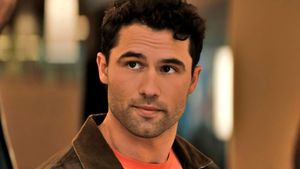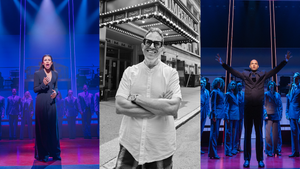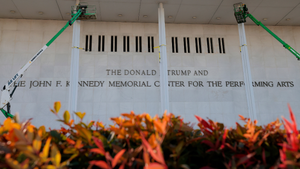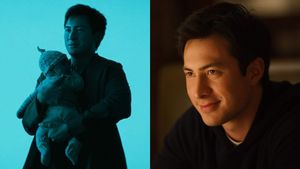To forgive is
divine. To forget may be asking too much of religious
conservatives when it comes to Sen. John McCain. The
Republican senator from Arizona and presidential
hopeful is working hard to repair relations with
conservative Christian activists, whose support could be
critical to winning the GOP nomination. But they
remain skeptical that he sincerely shares their values.
While McCain has managed to pry open some of the
doors that slammed shut in his rift with the Right
during his bid for the presidency in 2000,
conservatives' list of grievances against the candidate is substantial:
They are dubious about his opposition to a
federal amendment to ban same-sex marriage. McCain
opposes same-sex marriage but says it should be
regulated by the states.
They still resent passages in the
McCain-Feingold campaign finance law, which Christian
broadcasters say limit what they can tell voters before elections.
And they question the sincerity of his
overtures. McCain condemned evangelist leaders Pat
Robertson and Jerry Falwell as ''agents of
intolerance'' during his 2000 run.
Christian leaders still have ''a lot of
questions'' about McCain, said Paul Weyrich, who
founded the Moral Majority with Falwell and pioneered
efforts to mobilize evangelical voters. McCain-Feingold ''is
a big stumbling block for all of us,'' Weyrich said.
He and others also say McCain, a four-term Arizona
senator, largely ignored a measure on the November
ballot to ban same-sex marriage in his home state, although
he did endorse it in a TV ad. Arizona was the only
state where the effort failed in the last election.
''It seems to me that if he were really sincere,
he would have gone in with both feet and supported
that amendment,'' Weyrich said.
Focus on the Family founder James Dobson was
more blunt. ''I would not vote for John McCain under
any circumstances,'' Dobson said last month on KCBI, a
Dallas Christian radio station. ''I pray that we won't get
stuck with him.''
McCain is trying hard to avoid a repeat of the
2000 GOP presidential primaries in which now-president
Bush mobilized Christian conservative activists to
ultimately sink McCain's campaign. Prominent Christian
leaders, including Robertson and Falwell, opposed McCain in
2000, partly because they didn't feel he was
conservative enough on their issues.
''We've continued to reach out to leaders in
these very important states and communicate the
senator's record of advocacy for conservative
causes,'' said Danny Diaz, a spokesman for the McCain
campaign. ''What we've seen is a strong response and support.''
Contributing to McCain's strained relations with
religious conservatives was his past criticism of the
fundamentalist Christian college Bob Jones University
in Greenville, S.C., for its ban on interracial dating.
Political activists associated with the university helped
defeat McCain in the 2000 South Carolina primary. The
school has since lifted the ban. McCain now says he
wouldn't turn down an opportunity to speak there.
He also has hired David Rexrode, a veteran
campaigner who organized evangelical voters for the
Bush-Cheney campaign in 2004, to help repair the damage.
McCain has made amends with Falwell. He spoke at
Falwell's Liberty University last spring. On Monday,
Falwell and five other religious leaders will host a
''meet and greet'' for McCain at the National
Religious Broadcasters Convention in Orlando, Fla., a big
step, although Falwell has been careful to say it does
not constitute an endorsement.
But other efforts aren't going as smoothly.
McCain has said he hopes to patch things up with
Dobson, but Diaz wouldn't say whether Dobson and
McCain have spoken. Dobson declined a request for an
interview, and a Focus on the Family spokesman said
Dobson had nothing more to say about McCain. Robertson
also declined to discuss McCain.
McCain's seeming about-face with the Christian
right also has drawn criticism from Democrats and
eroded his image that appealed to swing voters in 2000.
In McCain's home state, Rep. Trent Franks, a
staunch opponent of abortion and same-sex marriage,
has split with the rest of the Republicans in the
Arizona congressional delegation, refusing to back the
senator's presidential bid. Instead, he's supporting a
long-shot GOP candidate, Rep. Duncan Hunter of
California, whom he calls an ''unequivocal social and
fiscal conservative.''
But McCain has at least one thing going for him
with the religious right: Christian leaders are also
wary of the other leading GOP presidential hopefuls,
former Massachusetts governor Mitt Romney and former New
York City mayor Rudy Giuliani. Giuliani supports
abortion rights and gay rights. Romney has supported
both in the past, although he now opposes abortion and
same-sex marriage.
With no clear social conservative among the
top-tier candidates, religious right leaders like the
Iowa Christian Alliance's Steve Scheffler say they are
now willing to at least give McCain a chance to
explain himself. That's a turnabout from last April, when
Scheffler told the Associated Press, ''There's no
support for McCain in this constituency.''
Since then, McCain has ''made overtures to talk
about his record,'' Scheffler said in a recent
interview. ''In many cases, he has a record
conservatives would feel comfortable with.''
Rexrode, McCain's organizer among Christian
conservatives, said that's the kind of sentiment he's
working for. Despite what Dobson and others have said,
when McCain explains his conservative record on abortion,
the war in Iraq, and federal spending, ''we're winning
people hand over fist,'' Rexrode said. ''Being able to
deliver that message and talk about it is really
opening some eyes about who the real Senator McCain is.''
(Jennifer Talhelm, AP)




































































Charlie Kirk DID say stoning gay people was the 'perfect law' — and these other heinous quotes